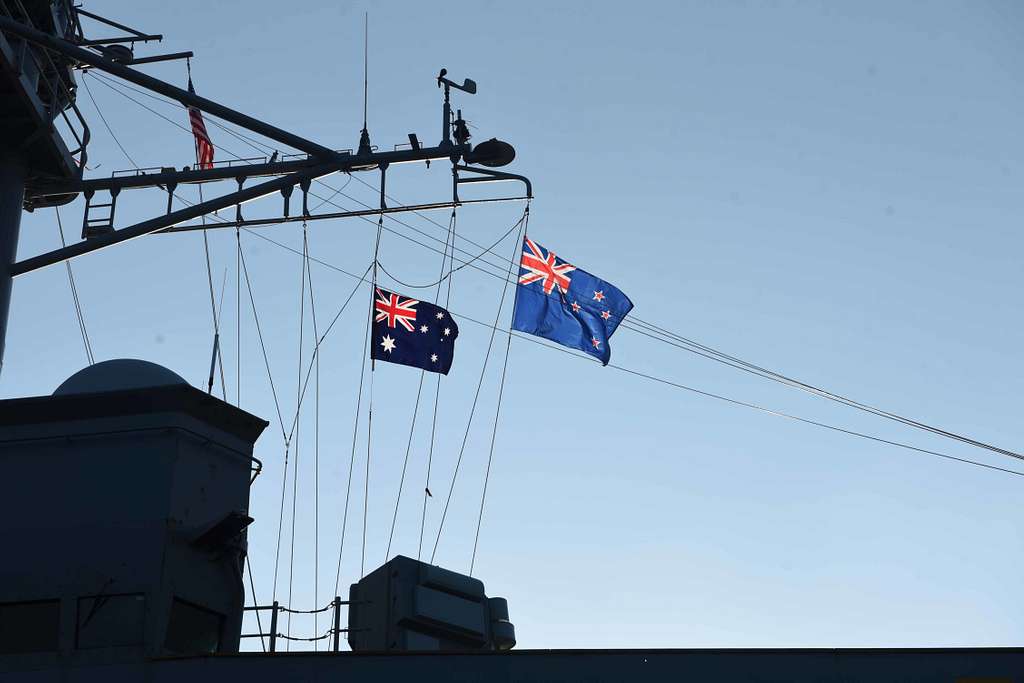The 2025 strikes on Iran expose a dangerous erosion of international law, as powerful states bypass legal norms under the guise of self-defence. Australia’s support for these actions underscores how alliance politics now routinely override legal and moral accountability.
The June 2025 Israeli strike on Iran—Operation Rising Lion—crystallises a fundamental corruption of international law: powerful nations routinely violate legal prohibitions on preemptive and preventive warfare while their victims face condemnation for defensive responses. Israel’s surprise air war on 13 June, targeting Iranian nuclear facilities and killing top military commanders, was followed nine days later by the United States joining the assault with Operation Midnight Hammer. Seven B-2 bombers flew a 37-hour mission from Missouri to drop massive bunker-buster bombs on Iran’s nuclear sites. All told, the conjoined operations, targeting also Iranian military leadership and nuclear scientists, killed 896, and injured 3,396.
This escalating series of attacks is best categorised as preventive—that is, strikes to neutralise a speculative threat before it materialises. It does not just undermine legal principles, it perpetuates cycles of violence that make genuine international security impossible for all.
The legal framework: Clear prohibitions, calculated violations
Pre-emptive wars have very limited and highly contested prescriptions under international law. The UN Charter’s prohibition on unilateral force and the Caroline principle establish clear boundaries: self-defence must be reserved for threats that are “instant, overwhelming, and leave no choice of means.”
Preventive strikes, conversely, have no basis under international law. Strikes cannot be justified solely on the grounds that a future attack is believed inevitable—as it is impossible to determine whether such a condition will ever come about. Moreover, determining such a threat to peace and security is solely the responsibility of the United Nations Security Council under international law. Yet powerful states systematically violate these principles while claiming extraordinary security exceptions for themselves.
Israel’s Operation Rising Lion exemplifies this calculated deception. Despite the International Atomic Energy Agency finding no evidence of Iran developing nuclear weapons, Israel launched a massive assault targeting nuclear sites, missile factories, and top officials to prevent Tehran from reaching a “point of no return.” The operation eliminated some 30 senior Iranian military commanders and at least 14 nuclear scientists working on what Israel claimed was a nuclear bomb.
This was not the first time. “Preventive” strikes have previously been launched against nuclear facilities in the region. Israel’s Begin Doctrine explicitly claims the right to attack any adversary’s nuclear facilities. In 1981, Israel bombed the Osirak nuclear reactor near Baghdad, Iraq, claiming to prevent its nuclear program. This garnered international criticism, even from the US. In 2007, the Israeli Air Force undertook another preventive strike on a nuclear facility, this time in Deir ez-Zor, Syria. There was also the Stuxnet cyberattack (with the US) that sabotaged Iranian nuclear centrifuges at Natanz in 2010.
The 2003 Iraq invasion marked a turning point for illegal preventive warfare. The US and its Coalition bypassed the UN Security Council’s rejection of its “second resolution” on Iraq, defying international law. UN Secretary-General Kofi Annan condemned the war as illegal, launched without imminent threat and based on faulty intelligence about weapons of mass destruction (WMDs). Deputy Defence Secretary Paul Wolfowitz admitted WMD claims were chosen “for bureaucratic reasons,” while weapons inspectors’ findings were ignored. The Rendon Group shaped public opinion in favour of war, with reporters like James Bamford claiming that coordinated messaging across platforms was designed to increase public acceptance of the WMD rationale for the invasion. Consequences were devastating: studies estimate between 461,000 and 2.4 million Iraqi deaths due to war-related causes.
The US Operation Midnight Hammer, conducted on 22 June 2025, continues this pattern—further unravelling international law. Seven B-2 bombers flew from Whiteman Air Force Base to drop fourteen 30,000-pound bunker-buster bombs on Iran’s Fordow, Natanz, and Isfahan facilities—not in response to imminent danger but as calculated power assertion.
Diplomatic hypocrisy: Alliance dependencies override legal principles
The systematic violation of international law depends crucially on media narratives that obscure power dynamics and normalises aggression. Iran’s decades of Treaty on the Non-Proliferation of Nuclear Weapons (NPT) compliance and International Atomic Energy Agency (IAEA) cooperation receive minimal attention compared to unverified weapons allegations. Meanwhile, Israel’s 90-400 undeclared nuclear warheads—an open secret—are barely mentioned. When Iranians respond to attacks, they are labelled aggressors; when Israel conducts pre-emptive strikes or assassinations, it is framed as “self-defence.”
The corruption of international law is completed through diplomatic responses that prioritise alliance relationships over legal consistency. Beyond violating international law, Operation Midnight Hammer also breached the US Constitution. Article I of the Constitution grants Congress the power to declare war, while Article II designates the president as commander-in-chief a deliberate separation designed to prevent unilateral executive military action. The framers deliberately separated these powers to prevent exactly what occurred—unilateral military action absent direct attack or imminent threat. As Senator Chris Murphy noted: “Only Congress has the authority to declare preemptive war.” The 1973 War Powers Resolution, meanwhile, requires presidents to seek congressional authorisation for military actions except in cases of imminent attack on the United States. Trump’s strikes proceeded without any congressional consultation or authorisation, with multiple lawmakers from both parties condemning the action as unconstitutional.
Australian Prime Minister Anthony Albanese’s backing of these strikes demonstrates how alliance dependencies corrupt not just international legal principles, but constitutional ones shared between liberal democratic states as well. Of course, the argument could be made that Albanese was being deferential in order to secure the AUKUS partnership. Nevertheless, this pattern—where Australia reflexively supports American actions regardless of their legal basis—undermines the very “rules-based order” both nations claim to champion. These rules are of profound interest to Australian security given its geopolitical isolation.
Australia’s response to the Iranian strikes also shows the short memory of Albanese who, back on 20 March 2003, said that supporting unilateral action by the US in the form of pre‑emptive strikes will change “forever the way that international politics works.” Prescient words.
This week however, Albanese explained the strike on Iran in stark contrast to his earlier position. He stated: “The world has long agreed that Iran cannot be allowed to get a nuclear weapon, and we support action to prevent that—that is what this is.” When pressed on the strikes’ legality, both Albanese and Foreign Minister Penny Wong avoided direct answers, deflecting with appeals to consensus as if agreement on ends somehow justifies illegal means.
Wong’s justification citing “what the international watchdog has said about Iran’s non-compliance” fails to acknowledge that non-compliance does not legally justify preventive military attack under the UN Charter. The Australian opposition proved even more hawkish, declaring the US had taken “proactive action” and celebrating bipartisan support. The government’s calls for “de-escalation” and “diplomacy” ring profoundly hollow when issued alongside the endorsement of illegal strikes.
While the IAEA in late May did claim obstruction of inspections and failures to account for nuclear material, it called for Iran to assist with resolving the outstanding issues—not a military strike. Such diplomatic efforts are only further jeopardised by such illegal military action, with some already suggesting it may make the program go underground. Australian experts warn that involvement in US strikes could make Australia a target, particularly given the role of facilities like Pine Gap in supporting such operations.
The vicious cycle: How double standards guarantee perpetual conflict
For middle powers like Australia, reflexively supporting ally violations while condemning adversary responses perpetuates this corruption. The alternative requires courage: applying consistent standards regardless of political alignment and recognising that selective enforcement ultimately serves no one’s security. When international law protects only the powerful, and the “rules-based order” reveals itself as naked hierarchy, weaker states may logically conclude that transparency invites attack, and that only nuclear deterrence can ensure their survival.
The question is not whether pre-emptive or preventive wars violate international law—they clearly do. The real question is how much longer any semblance of international law can survive when supposedly liberal states so openly defy it.
Juan Zahir Naranjo Cáceres is a PhD Candidate and Sessional Staff at University of the Sunshine Coast.
Dr Shannon Brincat is a Senior Lecturer in Politics and International Relations at the University of the Sunshine Coast.
This article is published under a Creative Commons License and may be republished with attribution.





